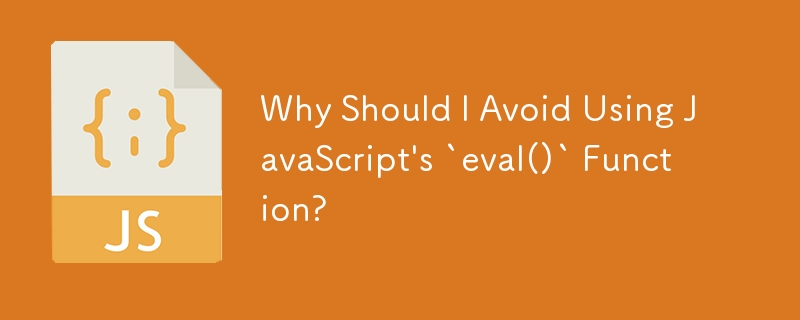Home >Web Front-end >JS Tutorial >Why Should I Avoid Using JavaScript's `eval()` Function?
Why Should I Avoid Using JavaScript's `eval()` Function?
- DDDOriginal
- 2024-12-22 05:28:11460browse

The Pitfalls of Employing JavaScript's Eval Function
Despite its utility in generating code dynamically, the JavaScript eval function carries significant risks. Let's explore the reasons why it's generally advisable to avoid using it.
Injection Attacks
Using eval exposes your code to injection attacks. When you evaluate user-supplied strings as code using eval, attackers can inject malicious code into your application, potentially compromising the integrity and security of your program.
Debugging Challenges
Debugging code that has been evaluated dynamically using eval can be a nightmare. The generated code does not have line numbers or source code mappings, making it difficult to pinpoint errors and trace their origin.
Performance Penalties
Eval-generated code executes slower than compiled code. JavaScript engines cannot optimize or cache eval-derived code, leading to a performance hit that can be significant.
Additional Considerations
While it may not be as pronounced as in the past, some eval-generated code still executes more slowly compared to compiled code. This can become an issue when evaluating scripts that undergo frequent modifications, as caching is not an option in such scenarios.
In light of these caveats, it is recommended to exercise caution when contemplating the use of the JavaScript eval function. Alternative approaches, such as dynamic function creation or code compilation, should be explored to mitigate the associated risks and preserve the performance and security of your applications.
The above is the detailed content of Why Should I Avoid Using JavaScript's `eval()` Function?. For more information, please follow other related articles on the PHP Chinese website!
Related articles
See more- An in-depth analysis of the Bootstrap list group component
- Detailed explanation of JavaScript function currying
- Complete example of JS password generation and strength detection (with demo source code download)
- Angularjs integrates WeChat UI (weui)
- How to quickly switch between Traditional Chinese and Simplified Chinese with JavaScript and the trick for websites to support switching between Simplified and Traditional Chinese_javascript skills

